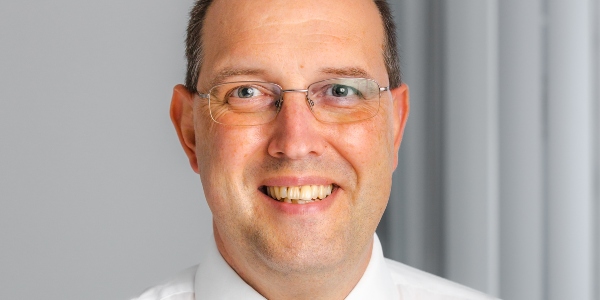
Radiographer Karl Nottage has just marked his 30 year anniversary working in the NHS, having started in the same department in October 1992.
Mr Nottage has been working in the North Devon District Hospital for 30 years, where he went from radiography helper to senior radiographer, and npw superintendent of the Dual Energy X-Ray Absorptiometry (DXA) service.
Throughout his time in the department Mr. Nottage has helped to train, educate and support students, and trainees in the profession.
'You have to tame the beast'
Mr Nottage said his most important career highlights have been becoming a radiographer, becoming lead practice educator and being able to support so many learners, reaccrediting as a SoR practice educator, and supporting his first cohort of apprentices to completing their degrees.
When asked about advice he would give to students, Mr Nottage added: “You have to tame the beast! A degree will eat you alive if you let it and will always want more from you, so make sure you have time for yourself.”
“When I started my further education studies I never set out to be a DXA service lead, reporting radiographer or practice educator, these things presented themselves along the way, and I grasped the opportunities. I would say don’t have too rigid a career path, as this might make you miss the most amazing opportunity you could have been offered!”
'It was meant to be a stepping stone'
Mr Nottage started in his current department at the North Devon District Hospital, which is now part of the Royal Devon University healthcare NHS Foundation Trust, in October 1993 as a radiography helper.
“This was meant to be a stepping stone into the NHS,” he said. “Because at the time I thought I wanted to be a nurse. After I started this role, I found I really enjoyed it and the complexities of radiography within my role.”
Mr Nottage worked in the dark room processing images as well as clinically in ultrasound, supporting radiologists who were performing scans.
In 1998, Mr. Nottage was able to start a Non-Vocational Qualification in diagnostic and therapeutic support to develop his understanding of the role. Then six years later, he was entered onto a pilot trainee assistant practitioner course at the University of the West of England, where he was taught to perform general X-rays.
He said: “This was amazing and I really enjoyed this experience, as it was a pilot it had a few challenges along the way whilst they were working on content and remote delivery. I still had to print and post each essay off to the university for marking at that time.”
Expertise and education
Upon completion Mr Nottage worked as an assistant practitioner for a year and a half, after which he was offered the chance to upgrade his qualification to a diploma in radiography – for which he had an interview at a pub near Derriford Hospital.
He completed his degree in 2010, achieving a Band 5 radiographer role in his department, where he worked for six years before achieving the position of senior radiographer and deputy lead for the Dual Energy X-Ray Absorptiometry DXA service. Mr Nottage worked in this role for just over a year before becoming acting superintendent radiographer for DXA and head of the service. A year later, he achieved the full role.
While doing all this Mr Nottage worked at the University of Exeter as a clinical tutor, responsible for students on placement for two hospital sites in the south west as well as teaching. He also gained accreditation with the SoR as a practice educator.
In 2019, however, the combined workload had become too much – Mr Nottage brought his practice education role back into his department, where he has been DXA service lead and lead practice educator since.
'It is something I am so proud of'
Mr Nottage said it has been amazing to see the expansion of all modalities in the department, with capabilities, staff and patient volumes growing “massively” throughout his tenure.
He added: “I started at aged 22, so was one of the young ones of the department at the time and now am 52, so one of the older ones. I like that I have been here so long and it is something I am proud of. It has been an amazing supportive journey.
“I am grateful to all the people who have helped me along the way to be the practitioner I am now. This partly was why education became so important to me, as it is important to support the people who follow behind.”
Pushing forward
Mr Nottage was recently diagnosed with dyslexia and autism, a diagnosis which he says has changed his life, and has inspired him to support others.
He added: “This is a message I would like to pass on to others, not to let neurodiversity be a barrier to doing things and pushing forward. However, gaining this diagnosis has changed my life and I am well supported, as well I am now in a position to start supporting others.”
